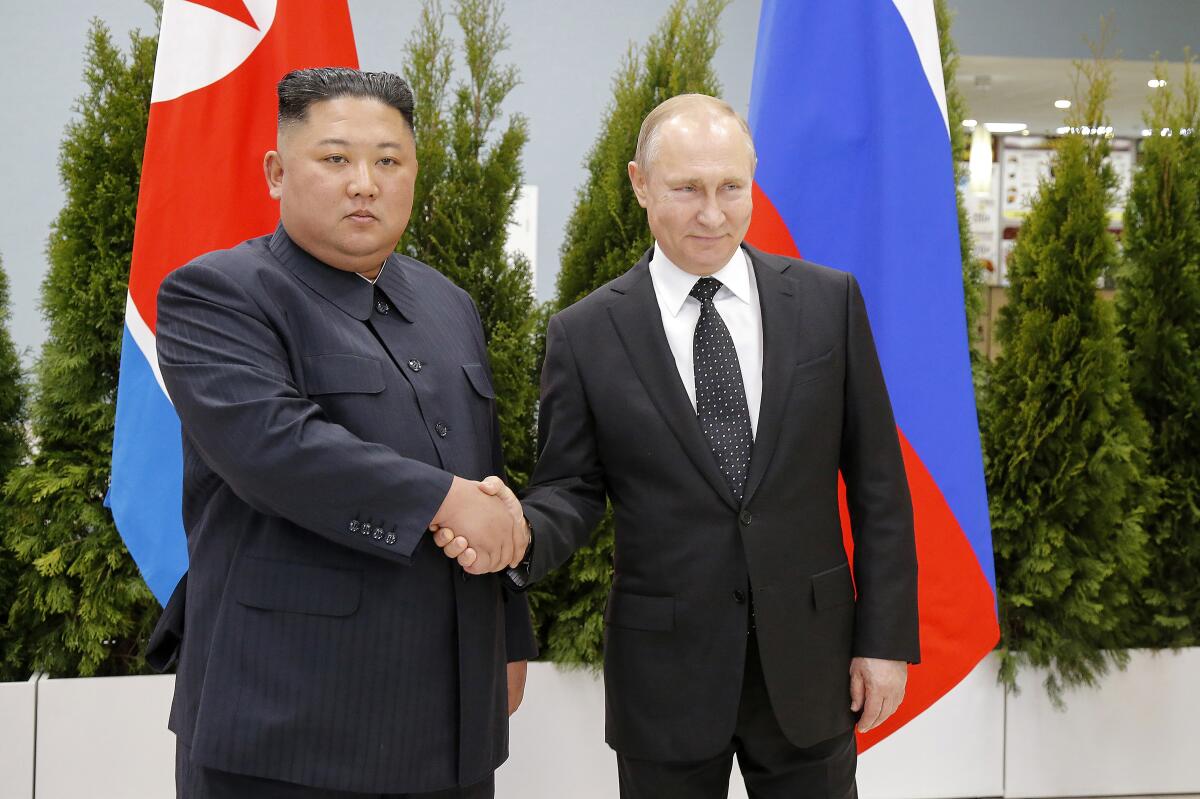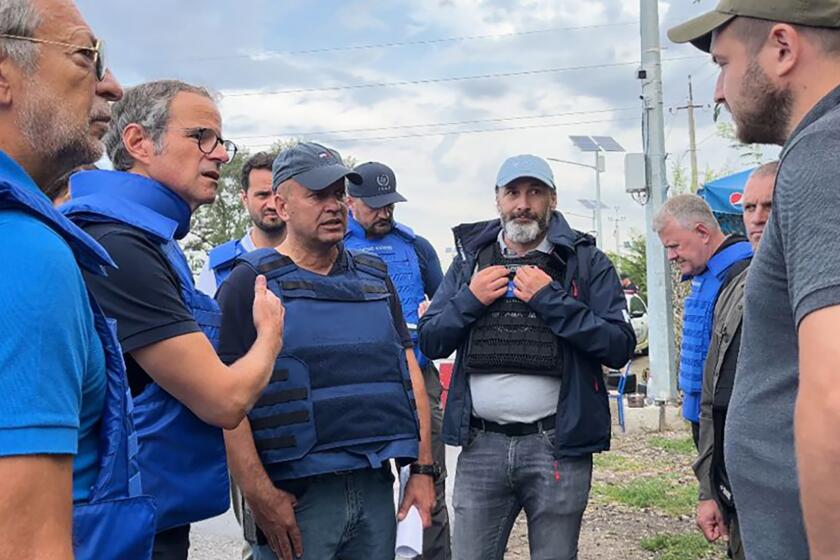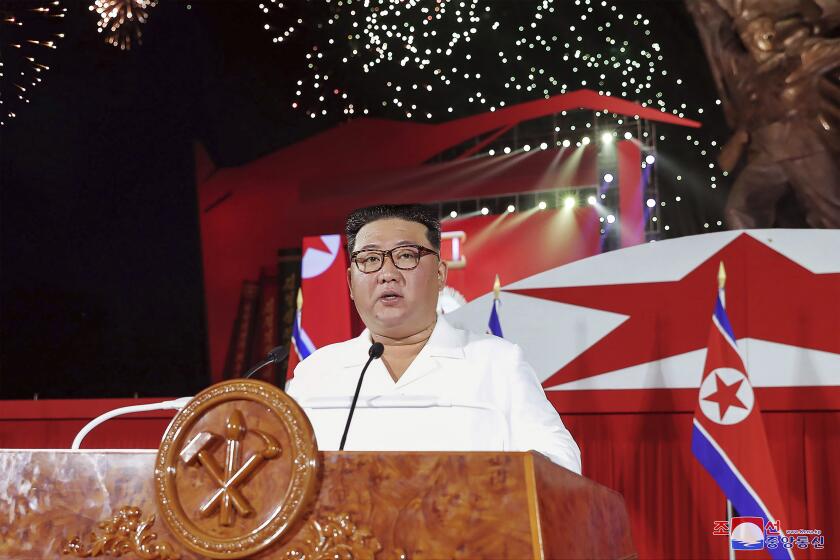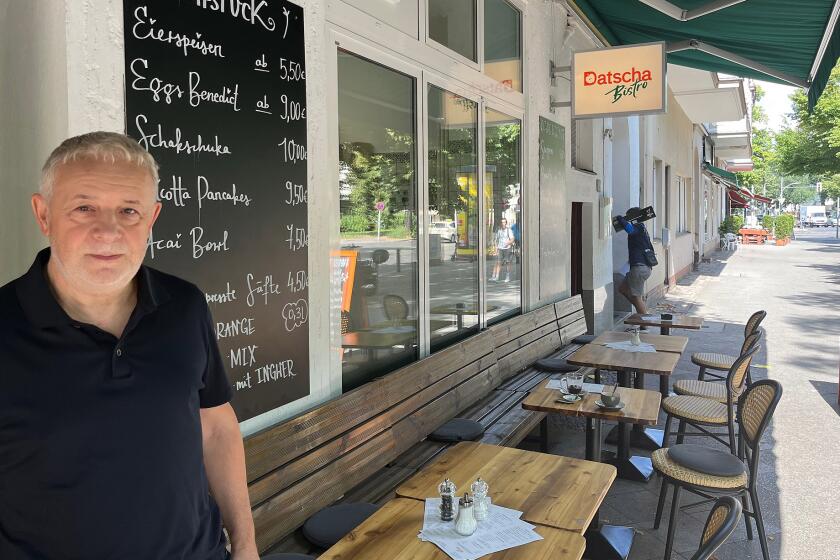North Korea may send workers to Russian-occupied east Ukraine

- Share via
SEOUL — As the war in Ukraine stretches into its seventh month, North Korea is hinting at its interest in sending construction workers to help rebuild Russian-occupied territories in the country’s east.
The idea is openly endorsed by senior Russian officials and diplomats, who foresee a cheap and hard-working workforce that could be thrown into the “most arduous conditions,” a term Russia’s ambassador to North Korea used in a recent interview.
North Korea’s ambassador to Moscow recently met with envoys from two Russia-backed separatist territories in the Donbas region of Ukraine and expressed optimism about cooperation in the “field of labor migration,” citing North Korea’s easing pandemic border controls.
The talks came after North Korea in July became the only nation aside from Russia and Syria to recognize the independence of the territories, Donetsk and Luhansk, further aligning Pyongyang with Moscow over the conflict in Ukraine.
The employment of North Korean workers in the Donbas would clearly run afoul of United Nations Security Council sanctions imposed on the North over its nuclear and missile programs and further complicate the U.S.-led international push for its nuclear disarmament.
Many experts doubt that North Korea will send workers while the war remains in flux, with a steady flow of Western weapons helping Ukraine to push back against much larger Russian forces.
The company that oversees Ukraine’s nuclear power plants says Russian shelling triggered a shutdown of one of the Zaporizhzhia facility’s reactors.
But they say it’s highly likely North Korea will supply labor to the Donbas when the fighting eases to boost its own economy, broken by years of U.S.-led sanctions, pandemic border closures and decades of mismanagement.
The labor exports would also contribute to a longer-term North Korean strategy of strengthening cooperation with Russia and China, another ideological ally, in an emerging partnership aimed at reducing U.S. influence in Asia.
Russian Deputy Prime Minister Marat Khusnullin has said that North Korean construction companies have already offered to help rebuild war-torn areas in the Donbas and that North Korean workers would be welcomed if they came.
That’s a clear break from Russia’s position in December 2017, when it backed new U.N. Security Council sanctions imposed on North Korea for testing an intercontinental ballistic missile. The sanctions require member states to expel all North Korean workers from their territories within 24 months.
North Korean leader Kim Jong Un warned he’s ready to use his nuclear weapons in potential military conflicts with the United States and South Korea.
Russia now seems eager to undercut those sanctions as it faces a U.S.-led pressure campaign aimed at isolating its economy over its aggression in Ukraine, said Lim Soo-ho, a senior analyst at the Institute for National Security Strategy, a think tank run by South Korea’s spy agency.
“For Russia, the idea of employing North Korean workers for postwar rebuilding has real merit,” Lim said. “Large numbers of North Korean construction workers came to Russia in previous years, and demand for their labor was strong because they were cheap and known for quality work.”
Before the 2017 sanctions, labor exports were a rare legitimate source of foreign currency for North Korea, bringing hundreds of millions of dollars a year to the government.
The U.S. State Department earlier estimated that about 100,000 North Koreans were working overseas in government-arranged jobs, primarily in Russia and China, but also in Africa, the Middle East, Europe and South Asia.
Germany is home to one of the world’s biggest Russian diaspora communities, but the Ukraine war has sparked incidents of ostracism and discrimination.
Civilian experts say the workers earned $200 million to $500 million a year for North Korea’s government while pocketing only a fraction of their salaries, often toiling for more than 12 hours a day under constant surveillance by their country’s security agents.
While Russia sent home some North Korean workers before the U.N. deadline in December 2019, an uncertain number remained, continuing to work or becoming stuck after the North sealed its borders to fend off COVID-19.
North Korea could easily mobilize several hundred or even thousands of workers to go to the Donbas if it decides to use the laborers who remained in Russia, said Kang Dong Wan, a North Korea expert at South Korea’s Dong-A University.
Russia is short of cash, battered by Western sanctions targeting its financial institutions and a broad swath of industries. North Korea likely has no interest in being paid in rubles because of worries about the currency’s purchasing power, which bottomed out during the war’s early days before Moscow took steps to artificially restore its value.
News Alerts
Get breaking news, investigations, analysis and more signature journalism from the Los Angeles Times in your inbox.
You may occasionally receive promotional content from the Los Angeles Times.
North Korea might be willing to be compensated with food, fuel and machinery, an exchange that would likely also violate Security Council sanctions, Lim said.
North Korea has repeatedly blamed the United States for the Ukraine crisis, saying the West’s “hegemonic policy” justifies military actions by Russia in Ukraine to protect itself.
Russia, meanwhile, has repeatedly condemned the revival of large-scale military exercises between the U.S. and South Korea this year, accusing the allies of provoking North Korea and aggravating tensions.
More to Read
Sign up for Essential California
The most important California stories and recommendations in your inbox every morning.
You may occasionally receive promotional content from the Los Angeles Times.
















